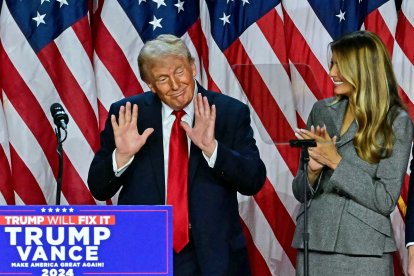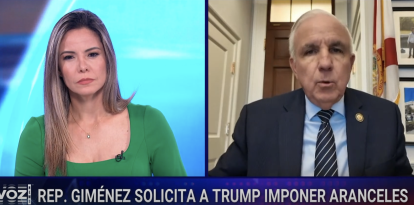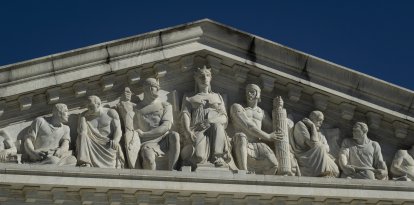According to the Democrats' logic, Trump should get 520 electoral votes
An initiative that states the winner of the popular vote should get as many electoral votes as possible already has 17 states and the District of Columbia as members.

Trump defeated Kamala Harris in the presidential election/Jim Watson.
Donald Trump defeated Kamala Harris in the presidential election in November. The Republican prevailed in each and every battleground state, thus winning 312 electoral votes against his Democratic opponent's 226. However, according to a popular initiative among Democratic states, he should actually get 520 electors.
The National Popular Vote Compact (NPVIC) already has 17 states and the District of Columbia as members. The idea is simple, that its members cede their electors to the winner of the popular vote, regardless of whether or not that candidate won the states in question.
Between all the members they total 209 electors, 39% of the total. The goal is to surpass the 270 needed to claim the presidency, with the objective of trying to give legal force to the pact. By their logic, Donald Trump should receive 520 of the 538 possible electors. Harris would then only be entitled to one delegate from Nebraska, the 13 from Virginia and the 4 from New Hampshire.

Politics
Diplomats and former intelligence officials call for Senate hearings to confirm Gabbard to occur behind closed doors
Emmanuel Alejandro Rondón

One of the states adhering to the compact is Minnesota, which joined the rest in 2023 under Tim Walz, Harris' running mate in November.
"If the Compact were enacted, it would mean that at least 270 electoral votes would go to the candidate who wins the popular vote nationally. As a result, the presidency would be awarded to the candidate who won the most votes nationally. In other words, the Compact would not abolish the Electoral College, but would bypass it to ensure that the winner of the Electoral College vote would be the winner of the national popular vote," explained the Richard & Rhoda Goldman School at University of Berkeley.
Since 1800, more than 700 proposals to eliminate or reform the electoral college were introduced, and the most recent is NPVIC.
The initiative gained traction after the 2000 presidential election, in which Al Gore won more than half a million more votes than George W. Bush, who prevailed in the number of electoral college votes and won the election. It picked up steam after 2016, when Hillary Clinton beat Trump in the popular vote by nearly three million votes, but lost the election.

Politics
Democrats in dire straits: demographics clearly favor Republican states in 2030 reallocation of seats
Emmanuel Alejandro Rondón

However, there are some legal reservations about the pact, specifically about its binding implementation. Some legal analysts point out that the compact required congressional consent, under the Compact Clause existing in Section 10 of the National Constitution.
"No state shall, without the consent of Congress, levy duties of tonnage, maintain troops or vessels of war in time of peace, enter into agreements or compacts with another state or with a foreign power, or go to war, unless actually invaded, or in such imminent peril as to admit of no delay," reads the Compact Clause.
The five popular vote winners who lost the electoral college
1824: Andrew Jackson defeated John Quincy Adams by 10.5 percentage points.
1876: Samuel Tilden defeated Rutherford B. Hayes by 3 percentage points.
1888: Grover Cleveland defeated Benjamin Harrison by 0.8 percentage points.
2000: Al Gore defeated George W. Bush by 0.5 percentage points.
2016: Hillary Clinton defeated Donald Trump in the popular vote by 2.1 percentage points.
RECOMMENDATION





















